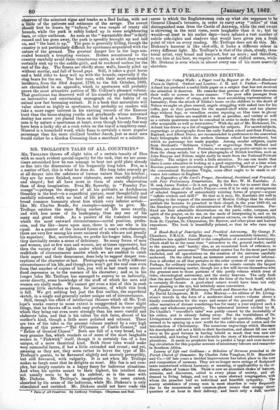MR. TROLLOPE'S TALES OF ALL COUNTRIES.*
MR. TROLLOPE throws off slight tales of a certain tenuity of fibre with so much evident special capacity for the task, that we are some- times astonished how he can manage to beat out gold plate already so fine into the dimensions of his frequently long tales. For, as a a matter of fact, this is what he does do. His long tales scarcely go at all deeper into the substance of human nature than his briefest ; they are far more finished, more elaborate, more carefully polished and shaped; but all have more in them of acute observation than of deep imagination. Even Mr. Sowerby, in "Framley Par- sonage"—perhaps the deepest of all his portraits as Archdeacon Grantley is the best—is a superficial picture, most thoughtfully and carefully coloured, with no trait of life left out; but without that broad common humanity about him which very inferior artists— like Mr. Charles Reade, for example—manage to give. Mr. Trollope catches the mere flying surface of life more exactly, and with less sense of its inadequacy, than any one of his many and great rivals. As a painter of the transient impress which the most outward circumstances—social position, profes- sion, and the like—leave upon man, there is no one who is his equal. As a painter of the inward forces of a man's own character, there are very few among his more eminent rivals who are not greatly his superiors. But, nevertheless, we prefer his longer tales, though they inevitably create a sense of deficiency. So many forms of men and women, and so few men and women, are at times oppressive, but then the variety of the lights under which they are regarded, the multitude of circumstances amidst which we are enabled to catch their aspect and their demeanour, does help to Suggest deeper con- ceptions of the character at last. Photograph a man in fifty different eireumstances of his life, and though you won't get the real man even from that number of copies of him, you will at last reach some de- fined impression as to the essence of his character; and so in his longer tales Mr. Trollope has managed to convey to us indirectly, never directly, some knowledge of the stuff of which his men and women are really made. We cannot get even a hint of this in such amusing little sketches as those, for instance, of which this book is full. We get nothing but just the first outline, the superficial sketch, in a single and generally rather unique set of circumstances.
Still, though the effect of intellectual thinness which all Mr. Trol- lope's works convey to some extent is exaggerated in these slight things, that he throws off in such easy profusion, there is one quality which they bring out even more strongly than his more careful and elaborate tales, and that is his talent for rich farce, almost of his mother's kind, though a little more polished and reticent. There are two of the tales in the present volume marked by a very high degree of this power—" The O'Connors of Castle Connor," and "Relics of General Chasse." Both are full of a very broad, but a very genuine fun, which reminds us of some of the most laughable scenes in "Pickwick" itself, though it is certainly fun of a less unique, of a more theatrical kind. Both these tales would make very successful farces, if but a little extended and recast; and yet, amusing as they are, they seem rather to lower the type of Mr. Trollope's genius, to be flavoured slightly and scarcely perceptibly, but still flavoured, with vulgarity. It is not when Mr. Trollope makes us laugh most that he delights us most. His fun is not com- plex, but simply consists in a happy fancy for ludicrous situations. And when his spirits mount to their highest, his intellect does not usually seem to be at its subtlest, as is the case with Mr. Dickens. Mr. Trollope's imagination is, to some extent, absorbed by his sense of the ludicrous, while Mr. Dickens's is only stimulated and enriched. Mr. Dickens could not have made the
• Toles 0/ 411 Countries. By Anthony Trollope. Chapman and Hall. scene in which the Englishwoman cuts up what she supposes to be General Chasse's trousers, in order to carry away "relics" of that distinguished man from the Castle of Antwerp, while the real owner is shivering in the next room, more laughable than it is ; but he would—at least in his earlier days—have infused a vast number of subtle side-lights and shadows that would have given you a fresh point of view on every reading Mr. Trollope does not do this. Mr. Dickens's humour is like shot-silk, it looks a different colour in every different light. Mr. Trollope's is that of the plain, steady, thea- trical artist, very broad and buoyant, but no more; and therefore, to see him at his best, we require a number of shifted scenes, while Mr. Dickens is seen whole in almost every one of his more masterly sketches.






























 Previous page
Previous page